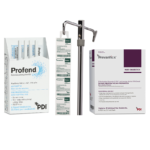Interventional Care


We notice that you are visiting us from . This site only services US-based visitors. Would you like to visit the site that is appropriate for your location?

Dirty Little Secret:
When someone is acutely ill, he/she relies on hospitals with trained professionals and employees to treat or alleviate their symptoms and/or illness(es). The patient puts his/her faith and trust in the healthcare facility and workers to take care of the problem, not add to it.
But, the reality is that 1 in 25 hospital patients has contracted at least one healthcare-associated infection[1] (or HAI)—many of which are preventable. In 2014, results of a project known as the HAI Prevalence Survey described the burden of HAIs in U.S. hospitals. The results showed that in 2011, there were an estimated 722,000 HAIs in U.S. acute care hospitals, with approximately 75,000 of those patients dying during their hospitalizations. And, more than half of all HAIs occurred outside of the intensive care unit.[2]
Those statistics are alarming, but consider this: 75,000 is a number that would fill up an entire pro football stadium. Imagine the reaction if everyone at the Superbowl died from a preventable illness! The picture in our minds should leave us shocked and horrified.
As caregivers, we must take responsibility for decreasing these numbers with full and open collaboration of all involved. Patients and their families are now, more than ever, their own advocates for protection against developing a new illness, while treating existing conditions.
A recent article in the Boston Globe provided several recommendations on how to stay safe in a hospital[3], including 1) check up on your hospital; 2) insist on hand washing; and 3) keep your environment clean. These are three basic tasks that we often overlook, but are key to keeping a patient’s hospital stay at a minimum.
It is important to remember the hospital’s priority must always be the wellness and care of the patient, both physically and emotionally. Hospitalizations can be trying and frightening for the patient. As caregivers, this is familiar to us, but for the patient, it is often an infrequent and isolating unknown. Our daily routines should not be just routine, but rather ongoing individual assessments of the patient. We must evaluate his/her situation and help him/her understand the patient bill of rights, always encouraging participation in his/her own care, alongside ours.
Patient Experience: A Two-Sided Process
The patient experience is monitored and evaluated not only for the welfare of the patient, but also for the continuous improvement of the hospital and its workers. The Hospital Consumer Assessment of Healthcare Providers and Systems (HCAHPS) is a patient satisfaction survey allowing patients to evaluate the care he/she received[4]. The responses are taken very seriously and can actually impact the reimbursement a hospital receives from the Center for Medicare & Medicaid Services (CMS). Questions regarding the care received from nurses and physicians are posed, as well as an overall rating system of the hospital (on cleanliness, etc.). [Check out the patient hand hygiene project where the lesson learned confirmed that implementation and consistency of a bedside hand hygiene program for patients with lowered mobility can enhance the overall patient experience during their stay in the hospital.]
Be Proactive
Awareness of the need to address and reduce healthcare associated infections is moving to the forefront of today’s headlines. No longer can we just sweep this under the rug and take a reactionary role to preventable infections that develop in facilities that are intended to be a safe refuge for the ill. We must all step up and be ahead of the curve with infection prevention as our goal.